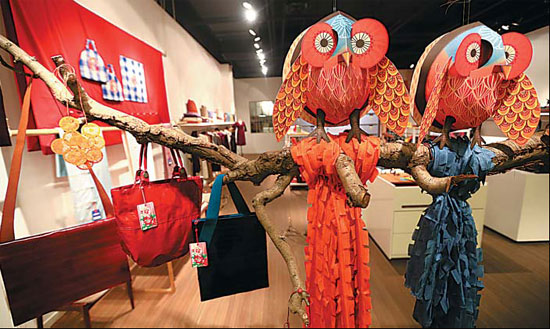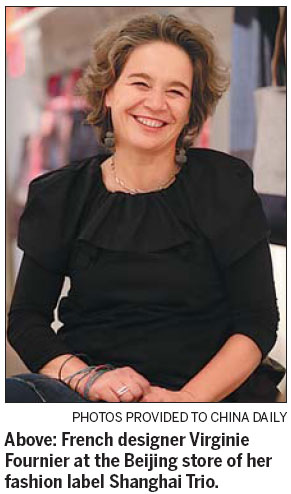Designer follows silk route from France to China
Updated: 2012-12-19 09:49
By Sun Yuanqing (China Daily)
|
||||||||
 |
|
Shanghai Trio's Beijing store makes customers feel like they are in a museum of vanishing Chinese handicrafts. |
When Virginie Fournier first saw Chinese silk brought to Lyon, France, by her grandfather decades ago, she could not help but marvel. Now, after more than a decade spent living in China, the founder and creative director of fashion label Shanghai Trio is still inspired.
"When I'm in China, I see beautiful things everywhere," she says.
Be it delicate silk or rough work jackets, Fournier knows how to resurrect traditional Chinese materials and crafts with a modern twist.
Displays in the Beijing store - there are two more stores in Shanghai - include a children's silk quilted jacket, a hand-woven cotton dress and 1980s-style printed cotton sheets, which give the place the feel of a museum of vanishing Chinese handicrafts.
Apart from clothes and fashion accessories, the chain also sells houseware with prices ranging from 80 yuan ($12.80) to tens of thousands.
"I really want to create a brand that is born in Shanghai, but it shouldn't be ethnic," Fournier says. "It should be modern."
But she's eager to "find the roots of China and use them". While Fournier stays faithful to traditions, she is not afraid to employ new elements, and China's bustling streets have been a constant inspiration for her.
Three years ago Fournier was using the neon orange that is now fashionable, inspired by people she saw on the street.
"It can be workers or travelers, immigrants or fashionable people. Why not mix it with silk and leather?"
Shanghai Trio's orange raincoat has been one of its best sellers.
The building industry has also been a source of ideas for Fournier. With modifications, an electrician's bag turns into a chic haversack.
Born and raised in Lyon, a city renowned for its beautiful fabrics, Fournier's keen eyes and refined tastes are innate. She also owes her fashion sense to her upbringing.
"This is really about education. It's not something I developed by myself. I was brought up by people who loved seeing the arts," she says.
"It doesn't have to be expensive or luxurious, but something nice. The childhood and teenage years are really important, because they feed your adult life."
Trained as a historian, Fournier had no clear idea what she was going to do when she first came to Shanghai with her husband in 1995.
All she knew was, "I wished to find beautiful things. For me, China was like Ali Baba's cave. It was certain that I could find beautiful things, but it was hard to do".
Fournier began to look at Chinese craftsmanship and materials such as silk, embroidery and bamboo. Then she began to search for suppliers. She opened her first store in Xintiandi, a trendy shopping area in Shanghai, in 1998, when independent brands were scarce and there was little demand for them.
"People were used to big investments. People were like, 'Who are you, where do you come from?' It was a huge challenge to order raw materials of good quality and small quantity. We felt like we were small," she says.
"Now, we beg less and we have to fight against ourselves."

 'Taken 2' grabs movie box office crown
'Taken 2' grabs movie box office crown
 Rihanna's 'Diamonds' tops UK pop chart
Rihanna's 'Diamonds' tops UK pop chart
 Fans get look at vintage Rolling Stones
Fans get look at vintage Rolling Stones
 Celebrities attend Power of Women event
Celebrities attend Power of Women event
 Ang Lee breaks 'every rule' to make unlikely new Life of Pi film
Ang Lee breaks 'every rule' to make unlikely new Life of Pi film
 Rihanna almost thrown out of nightclub
Rihanna almost thrown out of nightclub
 'Dark Knight' wins weekend box office
'Dark Knight' wins weekend box office
 'Total Recall' stars gather in Beverly Hills
'Total Recall' stars gather in Beverly Hills
Most Viewed
Editor's Picks

|

|

|

|

|

|
Today's Top News
Health new priority for quake zone
Xi meets US top military officer
Japan's boats driven out of Diaoyu
China mulls online shopping legislation
Bird flu death toll rises to 22
Putin appoints new ambassador to China
Japanese ships blocked from Diaoyu Islands
Inspired by Guan, more Chinese pick up golf
US Weekly

|

|







